Problems of Nigerian Education System & Solutions 2024: Top 11
- Post author: Edeh Samuel Chukwuemeka ACMC
- Post published: November 11, 2023
- Post category: Scholarly Articles
Challenges and problems of Nigerian Education System and Solutions: Have you ever wondered why Nigeria is always counted as one of the countries with poor education system in Africa and in the world? Well, the reasons are not far fetched. In this article, we will be taking a comprehensive look at the education system of Nigeria, the problems of education and the solutions to the problems of Nigerian education system. I strongly encourage you to read this article painstakingly so as to enable you graps a thing or two from this work.
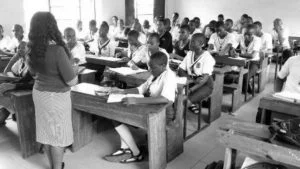
RECOMMENDED: Examination malpractice in Nigeria: Causes, effects and solutions
Education is the process of giving and receiving systematic enlightenment. Education could be in a formal setting or an informal setting. Informal setting here are places other than the academic environment, (that is schools) where an individual acquires values and skills. Education can be said to be in a formal setting where the students are engaged in learning in a formal environment (classes).
Education plays a vital role in the society, and a few of the contributions are:
a. Social development : Education undoubtedly leads to social development, as skills and values are acquired in a manner that would help sharpen the economy and occupational structure.
It serves as a tool for social integration: this it does, by integrating people into the bigger society. Education serves as a means of teaching students their place and usefulness in the society.
b. Personality development : Education goes a long way in developing the personality of students. When a child is born, his mind is a “ tabula rasa ”, meaning it is an empty slate, and it is up to the society to inculcate certain values, knowledge and develop his mind.
An educational system refers to the economic and social factors that constitute the school. These factors could ne funding, staffing, compensation or resources needed for the management and day to day activities of the school. Educational system is majorly influenced by the communication, exchange of ideas, funding and research of scholars and the government. It is worthy of note that these pertains to only public schools and universities.

Nigeria’s educational system is based on the 1-6-3-3-4 approach. What this means is that the child spends one year at nursery school, six years at primary school, three years at junior secondary school, three more years at senior secondary school completing the secondary school education and lastly, minimum of four years in the university or polytechnic (tertiary institutions). It is worthy of note that this system/mode was successfully used in a few countries like China, Germany, Ghana, before it was adopted by Nigeria.
Also see: Solutions to the problems of the judiciary in Nigeria
Table of Contents

11 Major Challenges and Problems of the Nigerian Educational System
1. Infrastructural decay : The public institutions is a mess, as the buildings are more of dilapidated buildings than they are of learning environments, there are not enough classrooms teaching aids (laboratories, computers) and even the libraries are in a pitiful condition. Every year, monies are being allocated for the educational sector but nothing changes.
2. High tuition fees : the essence of public schools is for its affordability. A lot of people cannot afford to pay for these schools and end up being drop outs. In Nigeria, about 10.5 million are out of school, with finance being a major reason.
3. Nepotism in admission: Students write Jamb and post Utme, yet they are not given their deserved position because they are sidelined as nobodies or not belonging to a particular clan or ethnic group. This is also evident in the employment of lecturers, as tribe and language is considered over capability and expertise.
4. Cultism: Cultism is one thing that has eroded the educational community. The need for students to be feared and feel powerful is one reason for the advancement of this plague by the students, sexual harassment by teachers on their female students coercing them into having sex for grades, teacher victimization of students and a lot more.

Recommended: History of Education in Nigeria
5. Corruption : This is one major disease eating into the educational system. Examples are examination malpractice by students encouraged by teachers who have been paid to aid the process.

6. Greed : As you may known, problems always lead to another problem. Greed is a big problem in the Nigerian education system because most teachers aren’t paid as they are supposed. Consequently, even when the government finally decides to pay teachers, those who are the head of these school usually keep some of the money to themselves rather than pay the supposed salary or wage to school workers.
In most secondary and tertiary schools in Nigeria now, Lecturers/teachers don’t make enough money from their salary. They do this by collecting money from students or mandating them to get school materials for a pay or they will fail.
7. Outdated school curriculum: This is another huge challenge of the Nigerian education system. It is also the reason why Nigeria is lagging when it comes to technological growth, development and information in Africa as a whole. In most tertiary institutions in Nigeria, students are making use of old and outdated books . The worst of all is the fact that teachers and lectures who are assigned to teach are usually reluctant to keep students up to date with the trends in their fields of study. This is so because even the teachers are old too.
While other countries like South Africa, Canada, US and the UK are already making use of technology to solve academic problems for students, most Nigerian teachers are not even computer literate to start with. This is undoubtedly one of the biggest problems of Nigeria education system.
Recommended: Countries with the most beautiful women in the world
8. Bad parental upbringing: There is a popular adage that “ Charity begins at home “. This goes to explain that whatever a child or student does in the public has already started at home. Parents are undoubtedly one of the most important parts of their children’s life and the way the children are brought up goes a long way to determine their moral standards.

Believe it or not, 40% of students who engage in examination malpractice frequently in school these days grew up where they didn’t find cheating as something bad. This could be because of their home or even the environment where they grew.
In light of the above, parental upbringing affects the education system of Nigeria indirectly. When parents try to bring up their children the right way it becomes hard for those children to engage in examination malpractice and it also becomes easier for the teacher to stop such acts.
Recommended: Countries with the best education system in Africa
9. Inadequate funding: Inadequate funding is an immediate problem facing the education system in Nigeria. This issue of inadequate funding has been in play for series of years, yet, it has not occurred to be a matter of concern to those in charge. The education sector ordinarily ought to be one of the sectors that is most invested in. It could be that several administrations have paid inadequate attention to the funding of the education sector because it seems not to be yielding immediate visible profit.

They have failed to understand that the impact of the education system is a long-term one which cuts across all sectors of a country’s economy and growth. Public schools in countries like Germany, France, Norway, Austria, Denmark, Spain, Sweden, Finland, Belgium, Brazil, Greece, Czech Republic, Iceland and so on, offer free tuition fees to students in their public schools. This is the extent of the countries’ investment in the education sector. This is the extent to which education is valued in such countries.
Who talks about free education in Nigeria? Would that ever become possible? Of Course, yes. But then, the basic funding should be made adequate first for proper revitalization of academic institutions. The education sector is the sector that has experienced the most number of strike actions owing to inadequate funding by government. The purposes of public schools have in fact been defeated as a result of inadequate funding. It is unusual for everybody to be wrong at the same time, so if the system is clamouring for a change, then there is certainly a call for attention.
Recommended: Most Popular People In The World 2024
10. Shortage of teaching staff/ unavailability of qualified teachers: Many Nigerian schools today have a single instructor teaching 3-5 courses, some of which they are not qualified to teach. Classroom teachers are compelled to become lab technicians, and some low-tier educational institutions do not even have teachers to take certain courses. These disappointing situations are a result of the lack of qualified teachers in the school system.

The poor working conditions, low pay, and inadequate benefits that Nigerian teachers must endure have deterred many capable and qualified individuals from entering the teaching profession. Those who have, however, do so out of a lack of better employment opportunities, which accounts for their lack of commitment as they are constantly looking for better opportunities. The resultant effect is a substantial fall in the quality of education in the country- which is heavily evident in the educational output.
11. Poor infrastructure and training facilities: In Nigeria, the majority of schools and institutions are in terrible shape. The majority of states have unfavourable educational environments.

The majority of the structures lack teaching materials and are in poor condition. Practical or technical resources are lacking in schools. Because of a lack of standard and up-to-date practical facilities, education is more theoretical and quantitative than qualitative.
Recommended: Advantages and Disadvantages of shopping online
For more about the problems of Nigerian education system, I encourage you to watch the YouTube video below. It highlights some other problems of Nigerian educational system not mentioned above.
Recommended: Highest paying businesses in Nigeria 2022
Solutions To The Problems Of Nigerian Education System
a. Appointment of capable persons as minister and commissioner of education : the commissioner of education and minister of education should not be appointed based on politics but on what they are capable of. Nigeria’s educational system has fared better in the hands and control of professional and expert ministers than in the hands of politicians who see everything as a medium to play politics. For example, in 1985, when Professor Jubril Aminu was minister of Education, progressive steps were taken. It was during his tenure that the 6-3-3-4 educational system was introduced. He also introduced nomadic education for the Fulani who are always on the road.

Another example of an expert minister of education is Professor Sam Egwu. During his administration, he entered into a pact with ASUU (Academic staff union of universities), providing conditions of service, funding of tertiary institutions, autonomy of universities and means and payment of lecturers. This is the pact causing trouble recently, as successive administrations are yet to fulfill the pact on the account that it is too much for them to handle, due to inadequate funds.
Again, Professor Babatunde Fafunwa, appointed in 1990, also made gigantic steps during his time. He introduced education using our indigenous language, this being one of the first, in Africa, as the usual language then was English.
These, in respect to now, goes a long way in proving that experts do better when placed in positions in correlation with their area of expertise, instead of a semi educated person who’s there only to advance political interest and barely knows his left from right.
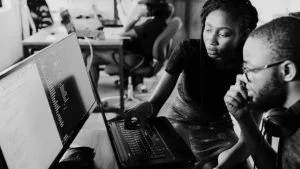
Recommended: Differences between Democracy And Republic
b. Adequate Funding : the monies allocated to the educational sector, part of which even gets to be embezzled, is very low. Thus, schools are learning to seek for ways of funding which as led to high increase of school fees (which has become too high for the poor people to afford) and commercialization of the schools, others, which have been neglected are in a poor, miserable states with low infrastructures and dilapidated buildings. If things continue like this, there will soon be no opportunity for schooling for the poor and average people in the society as schooling would be very expensive.
Hence, privatization is not the answer. Money spent on wasteful expenditure should be diverted to funding schools and renovating the buildings. Also, reading material and other materials needed for the running of the school should be provided by the government, to help make life easier for students.
c. Research: The Nigerian universities should be at the fore front of research in the country, especially in the sciences department. Libraries should be updated with recent books, research projects should be given utmost importance by the government and funding should be made in that respect.

d. Striking: the academic union for universities, polytechnics, and secondary schools are known for persistent strikes, and this is without fault; the government fails to pay them their dues and give them certain right to which they are entitled to. There is a need for this to change, in order to progressive movements to be evidenced in our educational sector. The teachers and lecturers should be paid their dues as and at the time due.
e. Anti-cult: Anti cultism groups should be created in schools with an aim to stopping cult practices in universities and schools and arresting offenders to the point of prosecution.
Also read: Reasons why women don’t participate in politics: 7 Reasons
In conclusion, the future of Nigerian educational system, now, is bleak. But there is still hope and this is subject to the seriousness of the government and the will to make it work. Government should place all hands on deck and seek to return the educational sector to its former glory.

Edeh Samuel Chukwuemeka, ACMC, is a lawyer and a certified mediator/conciliator in Nigeria. He is also a developer with knowledge in various programming languages. Samuel is determined to leverage his skills in technology, SEO, and legal practice to revolutionize the legal profession worldwide by creating web and mobile applications that simplify legal research. Sam is also passionate about educating and providing valuable information to people.
This Post Has 4 Comments
points of correction parent are never part of problems in Nigeria,quite alright you have shaded some lights in some of the problems,the current dillema that education found it self, its not resulting from from poor parental child upbringing rather,its the government,and system of governance in our country,a very clear example ,you take your children you are expecting them to be given the exepected changes,but the revers is the case,a child will finish his jss well equipped in exams malpractice a teacher guide him well how to prepare for ssce malpractice,and other offenses related.
Parents contribute to the problems facing education in Nigeria. Some of them before registering their wards in a school they will ask for their SSCE result sheets and proceed to ask shamelessly whether their wards will be assisted during the exams. If I may ask, who do sponsor outside WAEC exams for their children? Currently, the outside WAEC lives in our secondary schools nowadays. There is no exception on the problem of education in Nigeria. We all must stand to build back our education system.
I sincerely appreciate your work
Parents also contribute to the problems facing education.They even ask the school authority may be their wil pass
Comments are closed.
Global site navigation
- Capital Market
- Celebrities
- Celebrity biographies
- Messages - Wishes - Quotes
- Family and Relationships
Local editions
- Legit Nigeria News
- Legit Hausa News
- Legit French News
Problems of education in Nigeria in 2024 and potential solutions
The quality of education in any country is one of the major keys to national development. The decline in the quality and standard of education in Nigeria is alarming. Below are the pressing problems of education in Nigeria and solutions towards a brighter educational future for the nation.
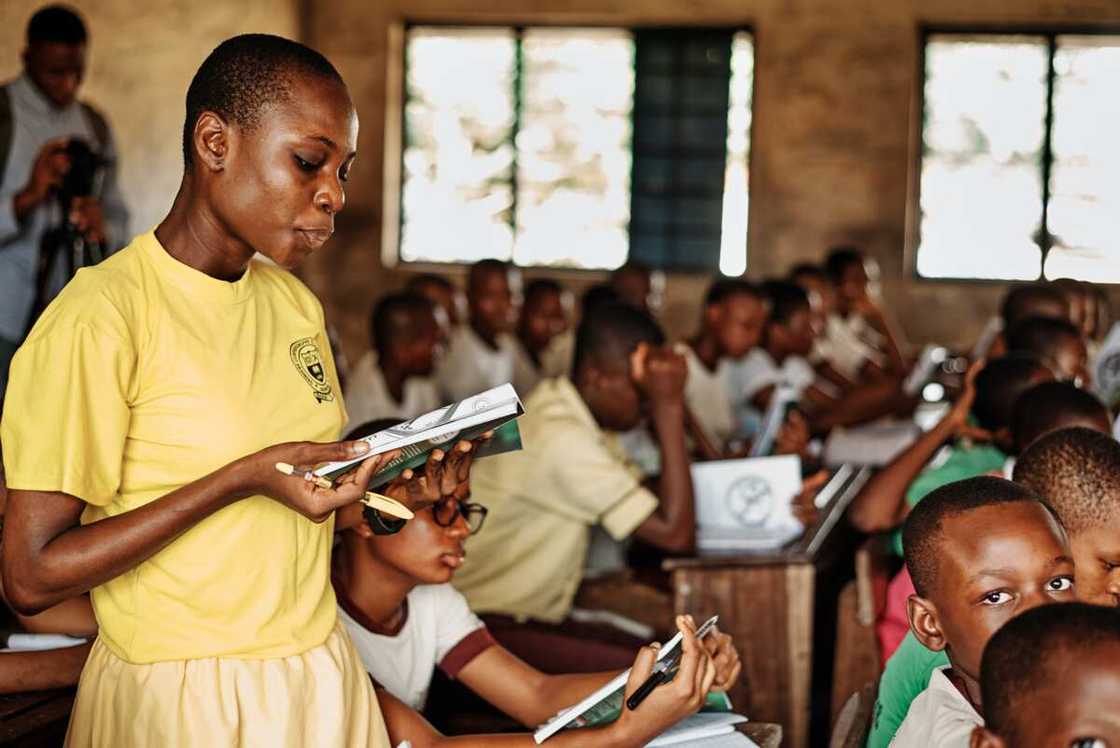
Nigeria's education system continues to face several issues, each of which poses a substantial difficulty to the country's progress and development. The government can improve the country's education quality by implementing new reforms and doing more to the education sector.
Problems of education in Nigeria and potential solutions
A good education opens many opportunities, from better employment prospects to developing a country. Nigeria has the potential to not only enhance the quality of education but also empower its citizens to contribute meaningfully to the nation's progress.
Factors affecting the educational system in Nigeria
Here are some of the significant issues confronting the education industry and the key criteria that should be considered to create an effective education system in Nigeria.

FG set to crash cooking gas price as Nigerians lament N1,300/kg cost
Poor governance and management
One thing that has crippled most sectors in Nigeria today is poor governance. The educational sector is not an exception. The government's attitude towards crucial problems of education, especially its quality, is lackadaisical.
Basic universal education suffers the most because primary education is neither fully controlled by the federal nor state or local governments.
Poor funding and neglect of the education sector
Education in Nigeria is poorly funded. It is not always given the priority it deserves in allocating government resources. Many schools in Nigeria suffer from dilapidated infrastructure, lack of proper sanitation facilities, and inadequate classrooms. This negatively impacts the learning environment and student outcomes.
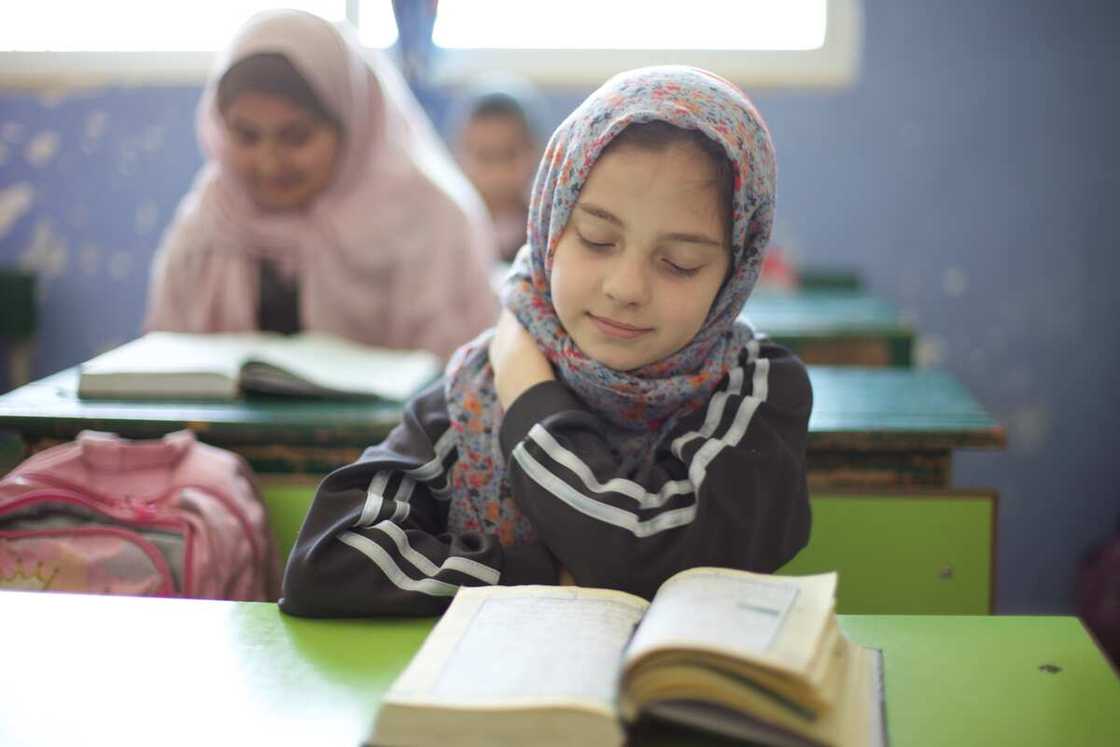
Corruption has led to the misallocation of funds that are meant for education. Money intended to build and maintain schools, provide learning materials, and enhance educational quality can be diverted to personal pockets or other sectors. As a result, schools suffer from inadequate infrastructure, lack of supplies, and reduced access to quality education.

Nigerian University explains decision to charge school fees in dollars
Poor infrastructure and training facilities
Poor infrastructure and training facilities profoundly impact education in Nigeria, affecting both the quality of learning and the overall educational experience for students and educators.
This has resulted in a lack of schools in certain areas, especially rural and remote regions. This limits students' access to education and forces them to travel long distances, often discouraging attendance.
Also, overcrowded classrooms make it difficult for teachers to provide personalized attention to each student. This hampers effective teaching and learning.
Low teacher quality
The quality of teachers varies widely, with issues such as unqualified or underqualified teachers, inadequate teacher training , and lack of professional development opportunities. This leads to subpar instruction and learning outcomes.
High level of exam malpractice
There is an alarming rate of exam malpractice in Nigeria. They are practised both by students and teachers. The inability of the government to curb this has caused a serious decline in the quality of the Nigerian education system products (level of knowledge).

Canadian province bans Nigerian students, others for 2 years
Insufficient technical and vocational education
There is a lack of emphasis on technical and vocational education, which can equip students with practical skills for various trades and industries. This contributes to a shortage of skilled labour.
Poor parenting and guidance
Numerous parents fall short of displaying adequate concern or assistance. Their primary focus is ensuring their children succeed, regardless of the methods employed. This absence of adequate guidance for their children results in them endorsing involvement in examination misconduct.
Solutions to educational problems in Nigeria
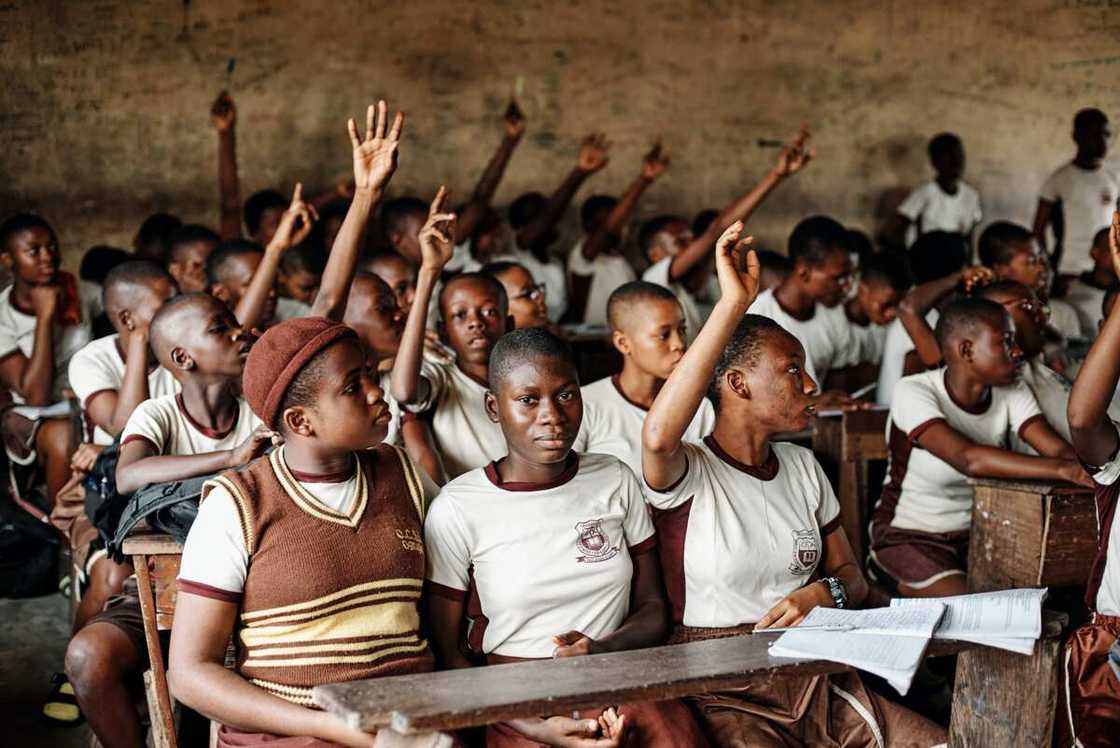
Here are several measures that can be taken to handle the obstacles confronting the education sector in Nigeria.
- Allocate a larger portion of the national budget to education to address resource shortages.
- Implement stricter measures to prevent corruption and ensure funds are used for their intended purpose.
- Improve teacher quality through better training, certification, and ongoing professional development.
- Update the curriculum to align with current societal needs and job market demands.
- Invest in building and renovating schools to provide conducive learning environments.
- Incorporate technology into education to enhance learning experiences and provide students with digital literacy skills.
- Collaborate with private organizations and NGOs to support education initiatives, provide resources, and improve the quality of education delivery.
- Improve education access and quality in rural and remote areas. Provide incentives for teachers to work in these regions.
- Establishment of more vocational and technical centres.
- Communication ability and skills in the language of instruction should be given special attention.

Denmark moves to recruit 1000 Nigerian, other health workers in a new deal
What are the major educational challenges in Nigeria?

Nigeria faces a range of challenges that hinder its progress and development. These challenges include inadequate funding for education, corruption, exam malpractice and poor infrastructure.
What is the main problem with secondary education in Nigeria?
Some of the major issues with secondary education are classroom overcrowding and insufficient learning resources.
What are some possible solutions to educational problems in Nigeria?
Some solutions that need to be implemented include effective governance, curriculum development, and a substantial increase in funding within the education sector.
How can technology improve the quality of education in Nigeria?
Technology has the potential to significantly enhance the quality of education in Nigeria. Online platforms and digital content can reach remote areas, enabling students to access educational materials that were previously inaccessible.
How can the government improve tertiary education in Nigeria?
It can improve through the contribution of infrastructural facilities and modern-day learning equipment.

Biden announces curbs on US investments in China
The problems of education in Nigeria are numerous, necessitating comprehensive solutions to ensure a brighter future for the nation's youth. Solving these issues will advance the nation's development and benefit the educational system.
Legit.ng recently published an article on various demonstration methods of teaching. Using the appropriate teaching methods allows trainers, tutors, lecturers, and teachers to offer enjoyable and productive classroom experiences for students.
The demonstration teaching method is based on giving a practical exhibition and explaining something. It improves the retention of knowledge and skills and is strongly advised by education professionals at all academic learning levels.
Source: Legit.ng
Adrianna Simwa (Lifestyle writer) Adrianna Simwa is a content writer at Legit.ng where she has worked since mid-2022. She has written for many periodicals on a variety of subjects, including news, celebrities, and lifestyle, for more than three years. She has worked for The Hoth, The Standard Group and Triple P Media. Adrianna graduated from Nairobi University with a Bachelor of Fine Arts (BFA) in 2020. In 2023, Simwa finished the AFP course on Digital Investigation Techniques. You can reach her through her email: [email protected]

Navigating the Challenges and Solutions of Nigeria’s Educational System
In the heart of West Africa lies Nigeria, a country teeming with cultural richness, diverse communities, and boundless potential. Yet, amidst this vibrant tapestry, the state of education casts a shadow of concern.
As we delve into the intricate web of challenges that the Nigerian education system faces, we begin to comprehend the gravity of the situation and the profound impact it has on the nation’s future. This blog post aims to shed light on the existing educational landscape, discussing its pressing issues, and emphasizing the crucial need for collective efforts to forge a path toward a brighter, more enlightened tomorrow.
Problems of Education in Nigeria
A country’s educational system serves as a cornerstone for its progress and development. In Nigeria, however, a series of interconnected issues have created hurdles that impede the realization of a robust and effective education sector. Let’s dive into these problems and understand their far-reaching consequences.
- Insufficient Funding and Resources:
One of the most pressing issues plaguing Nigeria’s education system is the chronic lack of funding and resources.
Insufficient investment in education has resulted in overcrowded classrooms, outdated materials, and a general inability to provide students with a conducive learning environment. The consequences are profound – hindered learning experiences and limited opportunities for growth.
Inadequate Infrastructure
In many regions of Nigeria, schools struggle with dilapidated infrastructure – from crumbling buildings to a lack of proper sanitation facilities. These conditions not only compromise the safety and health of students but also deter parents from sending their children to school, perpetuating a cycle of poor enrollment rates.
Teacher Shortages and Poor Quality of Teaching
Quality education relies heavily on skilled educators. Unfortunately, Nigeria faces a shortage of qualified teachers, and those available often lack proper support. This results in subpar teaching standards, hindering students’ ability to grasp essential concepts and stunting their overall academic growth.
High Illiteracy Rates
Despite efforts to improve literacy rates, a significant portion of Nigeria’s population remains illiterate. This impedes socio-economic progress, limits individuals’ opportunities, and contributes to a cycle of poverty that’s challenging to break.
Gender Disparities in Education:
Gender inequality seeps into the education system, with girls often facing barriers to attending school due to cultural norms, early marriages, and limited access to facilities. Bridging this gap is not only an educational imperative but also a step towards achieving broader societal equality.
Political Interference in Education
Educational policies should ideally be guided by experts and educators. However, political interference often leads to decisions that don’t prioritize the best interests of students and the broader education landscape.
Security Concerns for Students and Schools
The safety of students and educational institutions has been compromised by security challenges in certain regions of Nigeria. These concerns deter students from attending school and create a volatile learning environment.
Solutions to Problems of Education in Nigeria
As the challenges facing Nigeria’s education system become increasingly apparent, it’s crucial to move beyond identifying the issues and begin envisioning tangible solutions. By addressing these problems head-on and implementing comprehensive strategies, Nigeria can pave the way for a revitalized education sector that empowers its citizens and propels the nation towards a brighter future.
Increased Government Funding and Budget Allocation
Ways to Learn History Faster: A Comprehensive Guide
How to Help Your Child Develop Good Study Habits
How To Help Children Enjoy Their Summer Holidays
Prioritizing education in budget allocation is paramount. Increased government funding can alleviate resource shortages, enable infrastructure development, and provide educators with the necessary tools and support for effective teaching.
Infrastructure Development and Maintenance
Investment in infrastructure, including the construction and maintenance of school buildings, classrooms, and facilities, is essential. Safe and functional spaces enhance the learning experience and encourage higher enrollment rates.
Teacher Training and Professional Development
Empowering educators through comprehensive training and continuous professional development can elevate teaching standards. Well-trained teachers are better equipped to engage students, fostering a more productive learning environment.
Promoting Literacy Programs
Launching targeted literacy programs can combat high illiteracy rates. These programs should target both children and adults, promoting lifelong learning and enabling individuals to contribute more effectively to society.
Ensuring Equal Access to Education for All Genders
Promoting gender equality in education involves dismantling barriers that prevent girls from attending school. This could involve awareness campaigns, scholarships, and policy changes that encourage the enrollment and retention of female students.
Promotion of Technical and Vocational Training
Recognizing the importance of technical and vocational education, Nigeria should enhance the availability of training programs that equip students with practical skills for a diverse range of careers.
Stringent Measures Against Examination Malpractice:
To restore the integrity of examinations, strict measures should be implemented to deter and punish malpractice. These measures can include advanced monitoring techniques and severe consequences for those involved.
Autonomy of Educational Institutions
Granting educational institutions more autonomy can lead to more effective decision-making and better management of resources. This autonomy encourages innovation and responsiveness to the specific needs of students.
Improved Security Measures for Educational Institutions
Enhanced security measures are essential to create a safe and conducive learning environment. Collaborative efforts between the government, law enforcement, and communities can ensure the protection of students and educational facilities.
In the realm of education, the challenges faced by Nigeria are both intricate and deeply rooted. From inadequate funding to gender disparities, these issues have hindered the nation’s progress and dimmed the potential of countless young minds. Throughout this blog post, we’ve traversed the landscape of Nigeria’s education system, shedding light on the problems it faces and delving into potential solutions that hold the promise of a brighter tomorrow.
As we conclude our exploration, let’s recap the key points discussed in this journey. We’ve uncovered the pervasive problems of insufficient funding, inadequate infrastructure, teacher shortages, high illiteracy rates, gender disparities, and curriculum discrepancies. We’ve delved into the importance of technical and vocational education, the urgency to tackle examination malpractice, the need for autonomy in educational institutions, and the vital requirement for improved security measures. It’s evident that these interconnected issues demand a comprehensive approach that involves both systemic changes and shifts in societal perspectives.
Yet, in the face of these challenges, hope prevails. The path to revitalizing Nigeria’s education system is not one that can be traversed by a single entity. It’s a journey that requires the collective efforts of government bodies, educators, parents, communities, and innovative platforms such as Afrilearn, which harness the power of technology to provide accessible and quality education to all. Leveraging online education platforms can bridge geographical gaps, offer interactive learning experiences, and empower students to unlock their true potential.
In conclusion, the transformation of Nigeria’s education system is an endeavor that beckons every citizen to action. It’s a call to address the problems with determination, to embrace solutions with fervor, and to collaborate across all sectors for a common goal. As the sun sets on today’s challenges, it rises on the promise of a nation where education is a beacon of hope, a tool for progress, and a means to shape a vibrant future. Let us embark on this journey with unwavering resolve, knowing that the transformation of Nigeria’s education landscape is not just a dream – it’s a reality we can collectively forge.
From HND to B.Sc: Delta University Ozoro’s Pathway to Academic Advancement 2023/2024
Embracing Online Education: Exploring Advantages, and Importance
How To Help Students Excel in STEM Subjects
Leave A Reply Cancel Reply
Your email address will not be published.
Save my name, email, and website in this browser for the next time I comment.
Welcome, Login to your account.
Recover your password.
A password will be e-mailed to you.
- Blueprint Corporate Profile
- Online Advert Rates
- Privacy Policy

Blueprint Newspapers Limited
Blueprint gives you the latest Nigerian news in one place. Read the news behind the news on burning National issues, Kannywood, Videos and the Military
Educational challenges in Nigeria and possible solutions By Omale Angela Unekwu-ojo
The issues regarding education and its values are numerous and cannot be over emphasised.
Education facilitates learning and acquisition of knowledge, skills, values, beliefs, and habits. It ensures imparting or acquiring general knowledge, developing the powers of reasoning and judgment, and generally, prepares one for intellectually mature life.
Regardless of its many benefits and importance, education is faced with various challenges in schools.
If the challenges facing education are not tackled from the roots, they will continue to persist, just like a tree that grows back when it is cut instead of to uproot it.
A renowned educator, Kolawole Yetunde, enumerated the following problems as they affect education. He said the first and possibly one of the greatest challenges facing education is inadequate funding by the federal, state and local governments.
In 2017, Nigeria’s education sector was again allocated much lower than the 26 per cent of national budget recommended by the United Nations.
The global organisation recommends the budgetary benchmark of 26 percent to enable nations adequately cater for rising education demands. But in the proposal presented to the National Assembly, President Muhammadu Buhari allocated only 7.04 per cent of the 8.6 trillion naira 2018 budget to education.
The total sum allocated to the sector is N605.8bn, with N435.1bn for recurrent expenditure, N61.73bn for capital expenditure and N109.06bn for the Universal Basic Education Commission (UBEC).
Poor governance and mismanagement have endangered education sector like all other sectors. Government’s attitude towards crucial problems of education, especially its quality, is lackadaisical.
Governments at all levels are more concerned about issues that are not as important as education and this is crippling the sector.
Corruption is one of the major problems in the country and education sector is not an exception. There are stories of lecturers collecting bribes from students in exchange for good grades. School administrators demand money from students to have their exam results compiled and submitted to the National Youth Service Corps (NYSC). Admission seekers pay money to get admission into universities, and so on.
Also, school funds meant for salaries, maintenance and the like, are being diverted for personal use. This cuts across all levels of education: universities, polytechnics, colleges of education, private and public secondary schools.
Lack of responsibility and control is a problem not only affecting Nigeria but most countries of Africa. Who controls the education sector? Is it federal, state or local government? For example, the control of primary education is neither fully in the hand of federal government, nor state or local government. This is a great barrier for effective educational development at the basic level.
Works that needed to be done are left undone because no tier of government wants to take the responsibility.
Politicisation of education prompts governments at all levels, especially at the state level, to run many institutions even when they are least prepared to do so. This cause the general fall in the standard of the existing ones as the available budget cannot cater for all their needs.
In addition, state governments give accreditation to private schools that they know are not well equipped for teaching, all in a bid to generate more revenue for themselves.
Infrastructure in schools and other vocational institutions have collapsed due to abject neglect by governments.
Our tertiary institutions became dilapidated and their products are ill-trained so they cannot compete with other products outside the country.
Many schools lack basic equipment for conducive learning, most especially for science practical classes, and those that claim to have are using the obsolete ones. Hence, students only learn the theoretical aspects rather than the practical.
Also, the libraries in schools lack modern books, journals and magazines that aid learning.
Indiscipline manifested in examination malpractices, secret cult, rape, etc, are the bane of education. Investigation revealed that some examination centres exist where parents pay money to qualify their wards for credits in SSCE and cut-off marks in UTME. Poor parenting is one of the major causes of failure in the education sector. Parents are meant to provide the basic needs to meet the challenges of children’s lives, but many parents do not even show enough care or support. All they want is for their wards to excel irrespective of the means.
This lack of proper guidance gives room to paying for “special centres” for their wards.
Teaching aids are objects or devices used by teachers to enhance or enliven classroom instruction. There is a wide range of teaching aids which can be audio, video, books, projectors, computers, etc. These are not provided for teachers thereby making teaching difficult.
An effective curriculum which provides teachers, students, administrators with a measurable plan and structure for delivering quality education is lacking. And also because of policy inconsistence, most schools cannot keep up standards or result to using the British curriculum.
Unlike other academic disciplines that are highly competitive, there are scanty applications into faculties of education and colleges of education. According to research, in 2015, of the more than 1,700,000 applications for university admissions, less than five per cent applied for courses in education. These data point to the lack of interest of candidates for a career in the teaching profession.
Unstable condition of teaching has made most professionals search for alternatives and this, no doubt, affect their effectiveness and dedication.
The minimum wage in Nigeria is N18000. It will be hard for homes surviving on the wage to send their children to school because of high school fees, cost of books and so on.
The necessary textbooks needed for easier learning are either scarce or ridiculously expensive, making it hard for students or teachers to buy or use them.
When the causes of a problem are identified, it is believed that the solution to the problems is at hand.
In line with this topic, Johnson Olawale proffers the following solutions to problems of education in Nigeria.
The first step towards reviving the educational system lies in the hands of the government. Necessary steps need to be taken in order to restructure and save the sector. Governments at all levels need to commit to the delivering of a competitive standard of education across the country and with other countries.
Also, the right investments need to be done in order to get the desired results. Adequate funding with good management will provide high-quality education in Nigeria. Funds for renovation of schools and institution, acquiring quality training facilities, research grants, decent teachers’ salaries and welfare, etc, are the things that need to be increased, released and spent appropriately.
The level of corruption in education ministries and regulatory bodies needs to be taken seriously and tackled.
The level of exam malpractices needs to be curbed by a joint effort of the government and examination regulatory bodies.
Admissions into tertiary institutions should be based solely on merit.
Former executive secretary of National Universities Commission (NUC) and pro-chancellor of Crawford University, Igbesa, Ogun state, Professor Peter Okebukola, in 2017, also said that Nigeria could copy from countries such as Finland and Korea, which revived their economy by taking care of their education system .
“In countries like Finland and Korea, only the very best are admitted for teacher training, and when they graduate, they are paid well and are the envy of other professionals.”
“In Nigeria, the typical faculties of education of a university admit largely the dregs from the pool of UTME applicants. In 2017, application for courses in education and agriculture were the fewest.
“Most students want to read medicine, law, engineering and what they consider as prestige courses,” he said.
Okebukola also said that the five cardinals to improve the education system were to revamp the curriculum, suspend all sandwich programmes, embark on teachers’ recruitment, implement teachers’ salary scale and punish those that maltreat teachers.
When these solutions are put into action, we will be able to see real changes in the level of education in Nigeria.
The future of Nigeria is in the hands of the youths, and without educational liberty there will be decline in national development thereby affecting generations to come.
Omale Angela Unekwu-ojo is Mass Communication student at Kogi State University, Anyigba, and an IT student with Blueprint newspapers.
Related Posts
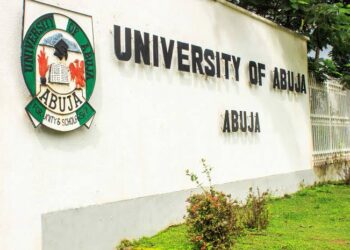
Updated : FG renames University of Abuja to Yakubu Gowon University
December 17, 2024 December 17, 2024

Breaking: UniAbuja now Yakubu Gowon University – FG
December 16, 2024 December 16, 2024
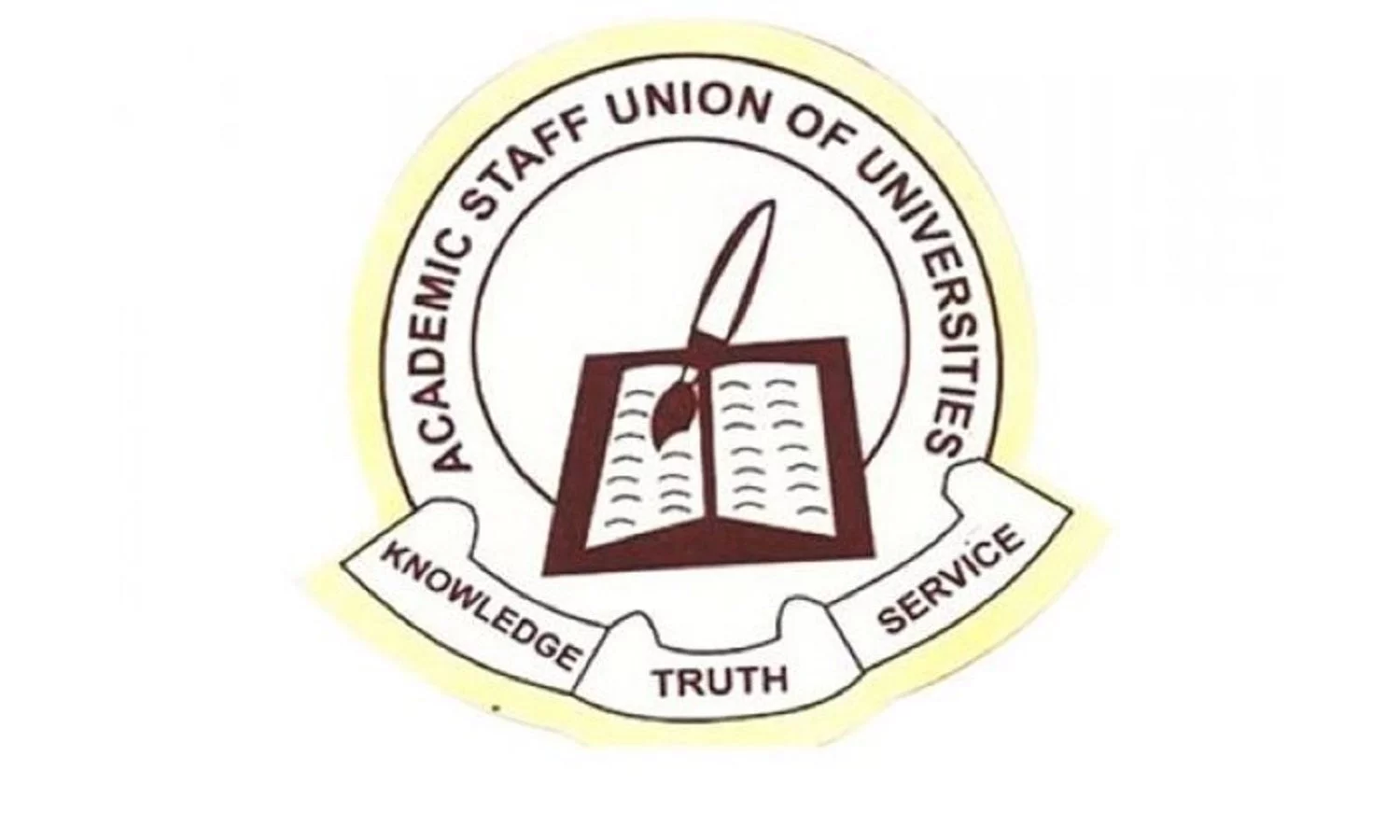
Bauchi: ASUU suspends strike
About admin iii.

Number One Online Information Blog
17 Current Problems of Education in Nigeria & Possible Solutions

Are you researching the problems of education in Nigeria and possible solutions to them? You made it to the right post, as the content you’re about to read will tell you all you need to know about the current education problems in Nigeria and possible solutions to them.
Have a good read.
Problems of Education in Nigeria – An Introduction
The current situation of Nigerian education is not encouraging, and it seems like the current problems facing education in Nigeria are too big to surmount.
The United Nations International Children’s Emergency Fund estimates that over 10 million children do not go to school in Nigeria .
These horrendous numbers don’t even include the number of uneducated adults or youths going through bad education.
In other words, the problem of education in Nigeria is colossal.
However, to give up is to let ignorance and illiteracy triumph.
The chances of incorporating quality into the education system in Nigeria are high, and there’s a need to start playing certain cards right.
But before anything can be done, the problems facing the Nigerian educational system have to be uncovered.
This article aims to highlight the problems of education in Nigeria and their possible solutions.
Related : How to Become a Citizen of Nigeria; A Complete Guide
Educational System in Nigeria – Problems and Prospects
To be honest, the Nigerian educational system is plagued with a multitude of problems, and with every passing minute, these problems get closer to crippling the entire country.
Here are some of the Nigerian education problems and their solutions.
1. Lack of Funding
This is the canopy under which most of the problems in the Nigerian educational system lie.
In plain terms, education in Nigeria is underfunded, and the government is not doing well when it comes to funding higher education in Nigeria.
The government would allocate billions of tax payer’s funds to less important or fictional sectors, rather than finance education in the country.
The lack of funds to finance Nigerian education is the reason why teachers are underpaid, academic bodies embark on strike, there are no facilities or standard laboratories, students “learn” in terrible environments, and there is a shortage of teaching staff.
It seems as if the government does not regard Nigerian education, because if they did, they would be intentional in their efforts to upgrade it to a standard level.
On another level, compared to Western education, Islamic education receives less funding from the government.
This remains one of the biggest problems of Islamic education in Nigeria.
Related : The Richest State in Nigeria; Top 10
2. Corruption
Like a cankerworm, corruption eats deep into the insides of any entity, and currently, it is feeding off the quality of education in Nigeria.
It is one of the major problems of financing education in Nigeria and it takes various forms in the Nigerian educational system.
First on the list is nepotism.
A situation where a person (student in this case) is favored over another; not on merit, but because of personal relations.
A close second is the diversion of school funds.
It throws the system off balance, and schools are found wanting in various sectors, thereby reducing the standard of education.
Examination Malpractice is not left out
Corruption within the system also breeds and encourages social vices such as examination malpractice.
This menace continues to lower the standards of graduates in society and it poses a big problem to the structure of the education system in Nigeria.
Other forms of corruption within the system include;
- Teacher absenteeism
- Bid-rigging of textbooks and school supplies
- Appointment of unqualified teachers, and
- Admission of unqualified students.
Corruption births many of the problems with education in Nigeria, and something needs to be done about it.
Related : Military Coups in Nigeria; All to Know
3. Poor Training of Teaching Staff
Teaching is more than walking into a classroom – chalk and textbook in hand and speaking for long hours.
There’s a psychological side to teaching, and it exists so that teachers can get through to their students.
Sadly, many teachers don’t even know this.
Even if they did know, they wouldn’t know how to go about it.
Poor or zero training.
When teachers don’t know how to effectively handle their students, they go about it the wrong way, and in the process, dish out bad education.
4. Depleting Interest and Belief in Education
A couple of years ago, getting a degree was the ticket to getting a good job and living the dream life.
Today, one might as well keep on dreaming, because the reality is that formal education is no longer enough – even if it is at the highest level.
There are millions of Nigerian graduates with great grades that have now been rendered redundant because there are no opportunities for them.
Education is no longer a ticket to success in the country, and as such the people, including the children, are losing faith and interest in it.
This has led to the unpopular saying, ‘School na scam.”
This is also one of the problems of traditional education in Nigeria.
These days, youths only care about making money – no one wants to learn about culture, customs, or societal traditions anymore.

5. Shortage of Teaching Staff
In many Nigerian schools today, you will find a single teacher taking on about 3-5 courses, some of which they are not qualified for.
Classroom teachers are forced to become lab technicians, and some low-tier schools don’t even have teachers to take certain courses.
These unfortunate situations exist because of the shortage of teaching staff in the educational system.
This may be partially attributed to poor salaries and remuneration packages, and zero recruitment plans.
This is one of the major problems of primary education in Nigeria.
Top Read : Security Agencies in Nigeria; Functions, Duties, Uniform, Everything to Know
6. Poor School Environments
Many primary, secondary, and tertiary institutions suffer from poor infrastructure and environments that are not conducive for learning.
Sometimes, students have no choice but to sit and write on the floor, there’s also the problem of noise and environmental pollution, as well as poor learning facilities.
These are the issues many Nigerian students face daily, making them victims of bad education.
Related : The Poorest States in Nigeria
7. Poor Teacher Welfare (Salaries and Compensation Packages)
Teachers and workers generally give out their best when they are appreciated and being compensated properly and when due.
In Nigeria, proper and timely payment of salaries and compensation packages is a myth.
Teachers and lecturers are owed months of salaries and remunerations, which begs the question, ‘will these teachers give their best in teaching students.’
Many teachers and lecturers are unhappy about the payment structure in Nigeria, and there is almost no way these people will be happy to impact knowledge into the lives of their students.
Cultism is a social vice that is currently plaguing many Nigerian schools.
The saddest part is that it is existent in as low as the secondary school level.
Students voluntarily/involuntarily join cult groups that exist to disrupt school proceedings and society.
Cultism in Nigerian schools does nothing but impede the growth of education.
School cultists engage in violence and destroy school properties like computer labs, which becomes a problem for computer education in Nigeria.
Furthermore, cultism breeds drug addicts, thugs, criminals, and young people that have no respect for authority whatsoever.
Victims of this feisty menace waste the best parts of their lives chasing dangerously irrelevant things, and for those who finally make it out alive or in sound health, they often realize it’s too late.
9. High Cost of Education
The legend of the Clash of Titans is a myth, and so is free education in Nigeria.
Education, even at the most basic level can be quite expensive for millions of Nigerian parents and children.
This is no surprise because the country has been quoted as the poverty capital of the world .
Many Nigerian parents cannot afford quality education in Nigeria for their kids. This is why they end up sending them to low standard schools that feed them nothing but poor education.
It is a tragic situation, but sadly, it is the reality of many Nigerians, especially in the Northern region .
During the Covid-19 pandemic, we saw many schools switch to online classes.
Despite the simplicity of this, many students were still unable to participate due to the cost associated with online learning.
Cost remains one of the problems of distance education in Nigeria, and is still amongst the problems of online learning in Nigeria.
Related : Full List of Commercial Banks in Nigeria 2021 & Their Worth
10. Diminishing Standards
Due to depleting standards of education in the country, basic achievements are now seen as spectacular.
Teachers, lecturers, and students do the bare minimum and leave it that way because that is what has been done for many years now.
The requirements for admission into some Nigerian schools reduces annually, which means less qualified, interested, and motivated individuals are gaining admission.
This may also indirectly equate to the breeding of incapable graduates.
11. Outdated Curriculums and Orientation
Nigerian education has never been dynamic.
Many schools, especially universities feed students with outdated information and facts.
Discoveries in tech, agriculture, science, art, and business occur every day, but many students are oblivious to this.
Those that strive to find out about these new updates are seen as “I too knows (ITKs)” and may even get reprimanded for trying to incorporate their newly-found knowledge into their learning.
Teaching with books and curriculums dating as far as the Stone Age makes many Nigerian students only as smart as dinosaurs and Neanderthals, and that is the situation today.
Top Read : Nigerian Coat of Arms; History, Meaning, Symbols, Facts, All to Know
12. Terrorism
Terrorism and insurgency are currently impeding the progress of formal education in Nigeria, especially in the Northern region.
Reports of kids being kidnapped from schools are almost as normal as the sun rising in this part of the world.
Teachers, students, and school management staff now go to school in fear, while some refuse to show up at all.
Who can blame them?
Education is fantastic, but sadly, red biros, textbooks, and chalk won’t do much against semi-automatic rifles and armored tanks.
13. Incompetent Teaching Staff
Sometimes, inefficient and bad education stems from incompetent teachers and lecturers.
In Nigeria, we have many incompetent, inexperienced, and clueless individuals disguising as teachers and scholars in schools.
They either feed students with wrong information, fail to make them understand basic theories, or don’t teach them what they should.
There are so many reasons why incompetent individuals plague Nigerian schools, some of which include;
- Shortage of staff
- Falsification of certificates, and
- Inability to hire competent teachers due to lack of funding.
This problem is negatively affecting the standard of education in Nigeria because students are not being taught by the right people.
14. Poor Parenting and Indiscipline
While it is true that parents always want what is best for their kids, some parents go about it the wrong way – especially when it comes to education.
A parent’s interest and motivation can have a massive effect on a child’s education, but some Nigerian parents show low or zero enthusiasm in their child’s education.
All they want to do is pay the fees and see good grades.
Also, many parents support examination malpractice by buying special centers for their kids to attend and have their exams written for them.
This is gross indiscipline on the part of many Nigerian parents.
Lastly, Nigerian parents often go overboard with scolding their kids for bad grades.
This affects kids physically and mentally, and indirectly have repercussions on their education.
Poor parenting and indiscipline are amongst the problems of early childhood education in Nigeria.
15. Poor or Inexistent Laboratories and Facilities
This is one of the problems of technical education in Nigeria.
It is one thing to teach students theories and abstracts, but being practical about it is a different ball game.
Laboratory help put things in perspective for many students and they get to have hands-on experience on what they learn in class.
Unfortunately, many Nigerian schools cannot provide this for their students.
16. Political Interference
Politicians run the show in many Nigerian schools, especially at the tertiary level.
They determine who gets admitted, individuals who get hired, how funds are allocated, who gets promoted, and even protect their people from disciplinary action.
Sometimes, they even fund cultism in tertiary institutions and use the brainwashed students for their devious political activities.
Education is meant to be independent of politics, but that is not the case in Nigeria.
Yes, politicians run Nigerian tertiary institutions and at this rate, they might just run it into the ground.
17. Religious and Cultural Extremism
Religion and culture are highly revered in Nigeria, but some sects take it a little bit too far.
Extremism is one of the problems of girl child education in Nigeria, as some cultural and religious sects believe that the girl child exists solely for marriage, giving birth, and serving a husband.
It is not only a heinous belief but also an inhumane one.
This is also an indirect problem of women education in Nigeria.
Extremism towards education has led to the rise of insurgency and terrorism in the country, with certain groups making ridiculous demands like the scraping of formal education in Nigeria.
Extremism is also one of the problems of non-formal education in Nigeria.
Ironically, the lack of education in Nigeria is the reason why religious and cultural extremism is threatening the system.
Selected Read : Functions of Central Bank of Nigeria You Didn’t Know
Some Other Problems of Nigerian Education are:
- Neglect of special education
- Zero plans and encouragement for low-achievers in class
- Using conventional education as the standard for measuring intelligence
- Excessive numbers of students in classrooms
- Poor policy implementation in Nigeria
These are only a few of the factors affecting education in Nigeria. There could be more.
Solutions to Problems of Education in Nigeria.
Good governance.
Any government that neglects the educational sector of its society is a bad one and that is what the current government, and many governments before it are.
Good governance will transform the educational sector by allocating enough funds, fighting terrorism against school children, building a standard school environment and laboratories, hiring competent teachers, and so on.
A good government would also tackle the problems of free education in Nigeria, and make education free.
Most of the problems of secondary education in Nigerian originate from bad governance, and if this is taken care of, Nigerian education will begin to transform positively.
Adequate Training of Teachers
Teachers do the teaching, but sometimes, they also need to be taught certain things for them to be good at what they do.
This will improve the standard of education in Nigeria, as teachers will be learning how best to impart the lives of their students.
This will go a long way in tackling the problems of education in Nigeria too.
Proper and Timely Payment of Wages
Nothing motivates Nigerians to do their jobs optimally more than due payment for services rendered.
Incentives may also be added to further encourage teachers.
This will also attract qualified teachers to many schools and drive a passion to study to become a teacher.
The reason why many students don’t want to become teachers is because of the poor salaries and bonus packages of their teachers.
If this is corrected, the problems of universal primary education in Nigeria will become a thing of the past and the Nigerian educational system is bound to soar high.
Curriculum Development
Curriculum development in Nigeria is vital at this point.
These ancient curriculums are only dragging Nigerian students into the past, while their mates around the world are already in the future.
Investing in Special Education
Ability lies in disability.
Special individuals also deserve a shot at quality education, and the government and non-governmental organizations should set up programs to help them.
This will drastically reduce the number of beggars on the streets of Nigeria.
Enlightenment and Empowerment
It almost feels like a total cultural, religious, and societal format is required to fight the problems of women’s education in Nigeria.
Since that is not possible, the next form of action is to enlighten the populace about the power of women in society.
Spread the word that women are not only vessels for children.
Also enlighten girls and women in the society, especially in the Northern region about the importance of education.
Empower them by sending them to proper schools where they can go through the education process and become better individuals.
Frequently Asked Questions (FAQs) on the Problems of Education in Nigeria
What are the problems of education in nigeria.
The problems of education in Nigeria include;
- Lack of funding
- Bad governance
- Religious and cultural extremism
- Incompetent teaching staff
- Poor infrastructure and laboratories
- Lack of training for teachers
- Political interference
- Cost of education
- Poor parenting and indiscipline
- Depleting interest and belief in education
- Shortage of teaching staff
- Diminishing standards
- Lack of proper salaries and compensation packages for teaching staff
- Outdated curriculums and orientation
What are the Problems of Citizenship Education in Nigeria?
Non-inclusion into the curriculum of Nigerian universities is one of the major problems of citizenship education in Nigeria.
This is as a result of the lack of broad-based education in Nigerian universities.
What are the Problems of Policy Implementation of Education in Nigeria?
Educational policies set the tone and quality of education in any country.
Think of these policies as practical manuals that highlight how education should be.
They map out the goals, plans, vision, objectives, and actions for the educational system.
Unfortunately, educational policy implementation is nothing to write home about in Nigeria, and it is one of the leading causes of the sad state of education in the country.
Here are some of the reasons for poor educational policy implementation in Nigeria:
- Indiscipline
- Inadequate policies
- Poor leadership
- Inadequate supervision
- Religious and cultural barriers
- Inadequate consultation
If the problems of educational planning in Nigeria can be tackled, we become closer to incorporating quality education into Nigeria.
How C an We Solve the Problem of Education in Nigeria?
Solving the problem of education in Nigeria will not be a stroll in the park, but it is not impossible.
Some of the ways we can solve the problem of education in Nigeria include:
- Allocation of proper funding for education
- Proper welfare of teaching staff (increase in salaries, due payment, etc.)
- Good governance
- Updating of obsolete curriculums
- Employment of qualified and professional teachers
- Exclusion of politics from the educational sector
- Adequate training of teachers
- Proper appreciation and celebration of academic excellence
Conclusion on the Problems of Education in Nigeria.
The current problem of education in Nigeria is one of the major project topics on education that needs urgent attention.
The great black revolutionary, Malcolm X said “Education is the passport to the future, for tomorrow belongs to those who prepare for it today.”
His words describe education as a powerful tool for the future, but sadly, millions of Nigerians suffer and will suffer from lack of it.
If you found this article on the problems of education in Nigeria insightful, do well to hit the share button . Do also leave a comment in the comment section.
Popular Among Readers
Zip postal codes for lagos state areas.

Follow my blog with Bloglovin This article highlights the zip postal codes for Lagos State Areas.…
Top Tourist Attractions & Things To Do In Borno State

New in Borno State or planning to visit? This article on Tourist Attractions & Things To…
Top 7 Things To Do In Enugu State; Never miss No. 5

New to Enugu State and wondering what to do? This blog post highlights the top things…
Top Tourist Attractions & Things to Do In Cross River State

New in Cross River or planning to visit? This post on top tourist attractions and things…
Top Tourist Attractions And Things To Do In Benue State

New in Benue or planning to visit? This article on top tourist attractions and things to…
Top Tourist Attractions And Top Things To Do In Abia State

New in Abia State or planning to visit? This article on top tourist attractions and things…
Top Tourist Attractions and Top Things to do in Adamawa State

New in Adamawa State or planning to visit? This article on top tourist attractions and things…
Top Tourist Attractions and Top Things to Do In Anambra State.

New in Anambra State or planning to visit? This article on top tourist attractions and things…
Leave a Comment Cancel Reply
Your email address will not be published. Required fields are marked *
Save my name, email, and website in this browser for the next time I comment.
Notify me of follow-up comments by email.
Notify me of new posts by email.
Information Hub
5 Problems of Education In Nigeria And Their Solutions (2023)
Educate a man and you will be taking a criminal off the street. Education is a great tool for recreating a man’s mind into thinking rationally and making the right decisions. It builds people. Despite having this knowledge, there are a lot of problems facing education in Nigeria, bringing up this post on the problems of education in Nigeria and their solutions. Please note that the problems are vast, we would only try to touch on some key aspects, with the hope that if these areas are solved, it will soften all other areas of education in our glorious country.
Problems of Education In Nigeria And Their Solutions
Lack of fund.
One of the major problems facing education in Nigeria is funding. The finances that are injected into the educational system is relatively low. According to statistics from 1997 and 2000, the expenses of the government for education was below 10% of the government’s budget. They don’t give much concentration into the education sector. In order to witness real growth in the educational system, there has to change as regards funding. The government has to pump money into the educational sector to ensure the development and upgrade of the sector.
Educate a man and you will be taking a criminal off the street
Lack of Responsibility & Proper Management
Another problem the educational system is facing is the problem of responsibility and adequate management. Many of the primary and secondary schools in Nigeria are not fully being accounted for. None of the tiers of Government is ready to fully take up the duty of taking care of the schools. Therefore, for the educational sector to move on, the government has to take responsibility for these schools.
Knowledge Acquisition / Training & Instability of Teachers
Also, the other factor that is limiting the progress of the Nigerian education sector is the lack of continuous, periodical training and instability of teachers and lecturers. In many secondary and primary school, teachers are changed many times in a year. And in order to have a better educational system, there must be enough measures taken to ensure stability in the teaching staff and periodical training of teachers/lecturers is a must.
The Politicization of the System
Another challenge the educational sector is facing is the way some people politicize it. Many parents use their political office or influence to get students’ admission and even the teacher’s recruitment officers. This issue has crippled the development of the educational sector. So, unless people remain fair and stop politicizing the recruitment exercises the expected change will still be dangling in his face.
Indiscipline
Another problem that remains a canker-worm in the educational sector is indiscipline. Many students dabble in exam malpractice, others join secret cults. All these and a lot more should be eradicated because children are the leaders and future of Nigeria. When the future of Nigeria is not taken care of now, there won’t be any future at all.
There you have it on Problems of Education in Nigeria and their Solutions. Share your thoughts and suggestions with us through the comment box and do not forget to like us on Facebook @ facebook.com/9jaquest
- Abokifx Lagos Black Market Exchange Rate Dollar Euro Pounds Naira
- List of Insurance Companies in Nigeria ( Name )
- STARVING AFRICAN CHILD | HUNGRY CHILDREN IN AFRICA: CAUSES & SOLUTION
tags: Problems of Education in Nigeria and their Solutions, problems facing education in Nigeria, educational development, falling standard of education causes, and remedies.

IMAGES
COMMENTS
Recommended: Highest paying businesses in Nigeria 2022. Solutions To The Problems Of Nigerian Education System. a. Appointment of capable persons as minister and commissioner of education: the commissioner of education and minister of education should not be appointed based on politics but on what they are capable of. Nigeria's educational ...
The first and possibly one of the greatest challenges facing education in Nigeria is inadequate funding by the federal, state and local government. In the year 2017, Nigeria's education sector was again allocated much lower than the 26 percent of national budget recommended by the United Nations.
Problems of Education in Nigeria The problems facing education in Nigeria is inexhaustible and the search for it is unlimited. Sometimes, old problems continue to be new problems as long as they remain unresolved. In fact, some of these problems continue to be chorus in our education song. Some of them include: 1.
The quality of education in any country is one of the major keys to national development. The decline in the quality and standard of education in Nigeria is alarming. Below are the pressing problems of education in Nigeria and solutions towards a brighter educational future for the nation. A student in yellow reading a book.
Socio-cultural differences and religious conflicts also pose significant challenges to developing Nigeria's education system. Nigeria is culturally diverse, with over 250 ethnic groups and 400 languages spoken. These conflicts can be traced back to colonialism when the British masters merged the Northern and Southern
Solutions to Problems of Education in Nigeria. As the challenges facing Nigeria's education system become increasingly apparent, it's crucial to move beyond identifying the issues and begin envisioning tangible solutions. By addressing these problems head-on and implementing comprehensive strategies, Nigeria can pave the way for a ...
In 2017, Nigeria's education sector was again allocated much lower than the 26 per cent of national budget recommended by the United Nations. ... When the causes of a problem are identified, it is believed that the solution to the problems is at hand. In line with this topic, Johnson Olawale proffers the following solutions to problems of ...
Conclusion on the Problems of Education in Nigeria. The current problem of education in Nigeria is one of the major project topics on education that needs urgent attention. The great black revolutionary, Malcolm X said "Education is the passport to the future, for tomorrow belongs to those who prepare for it today."
The crisis in Nigeria's education is being caused by the problems going on within the system and if not controlled, then the crisis won't stop. With the recommendations herein, it is ... Olawale .J (2017) Problems of education in Nigeria and their solutions. Retrieved via legit.ng on the 28th November, 2019. Tijani o.A , Ibrahim .B & Musa I ...
Problems of Education In Nigeria And Their Solutions. Lack of Fund; One of the major problems facing education in Nigeria is funding. The finances that are injected into the educational system is relatively low. According to statistics from 1997 and 2000, the expenses of the government for education was below 10% of the government's budget.